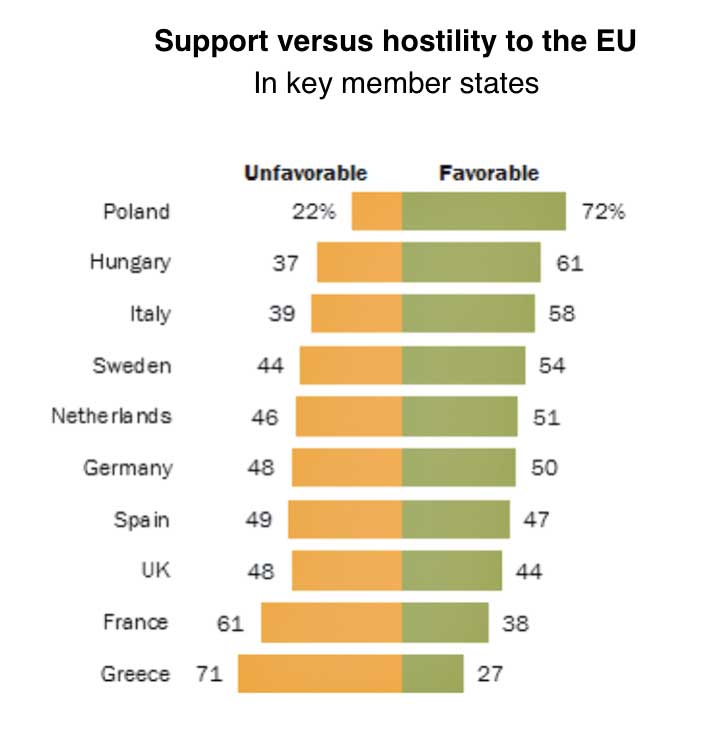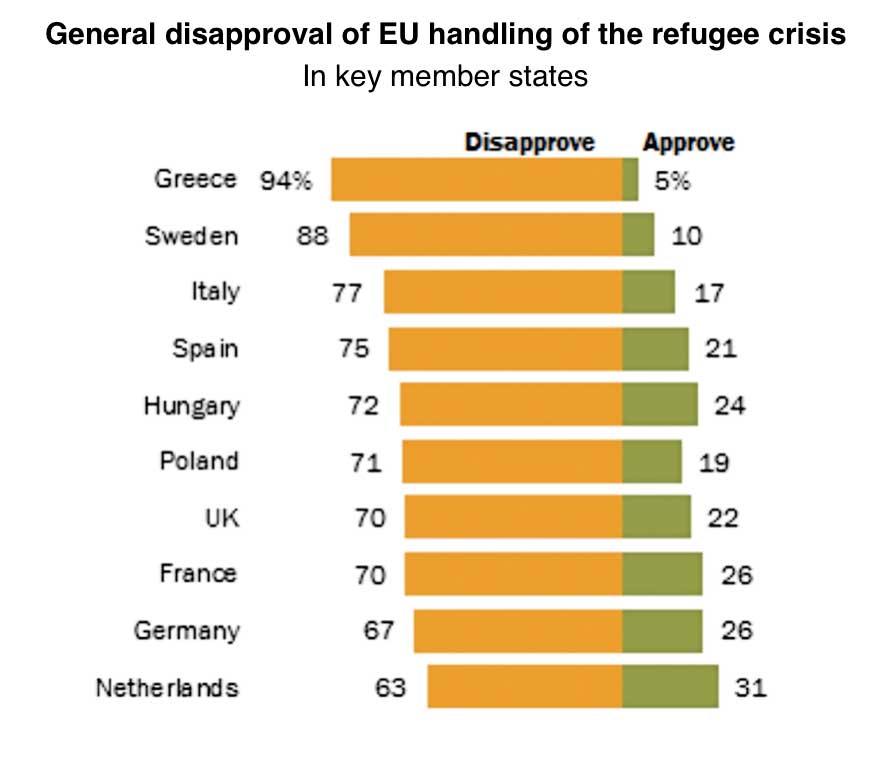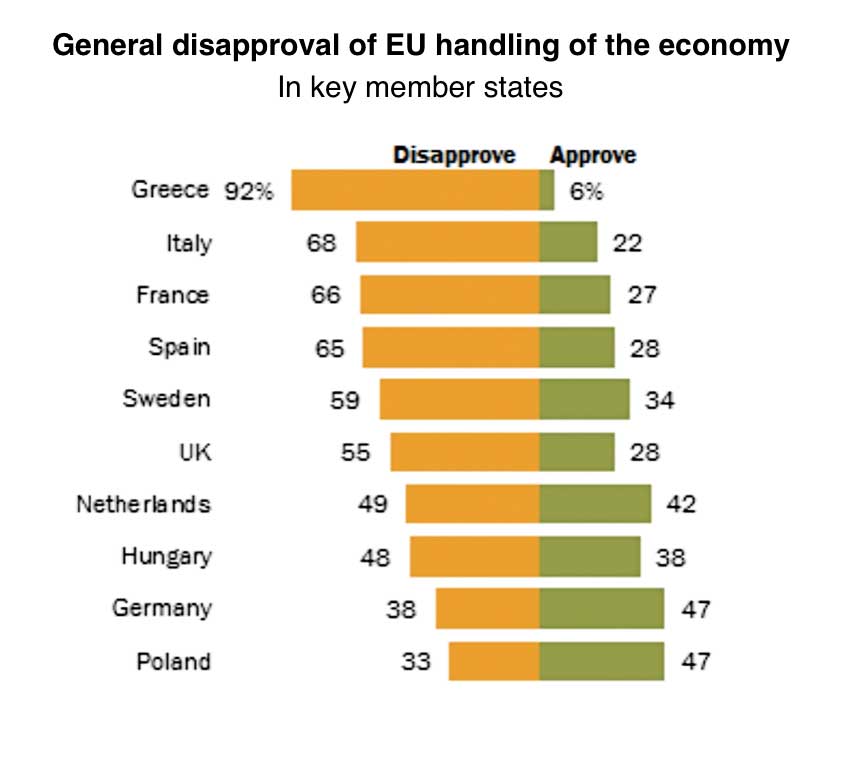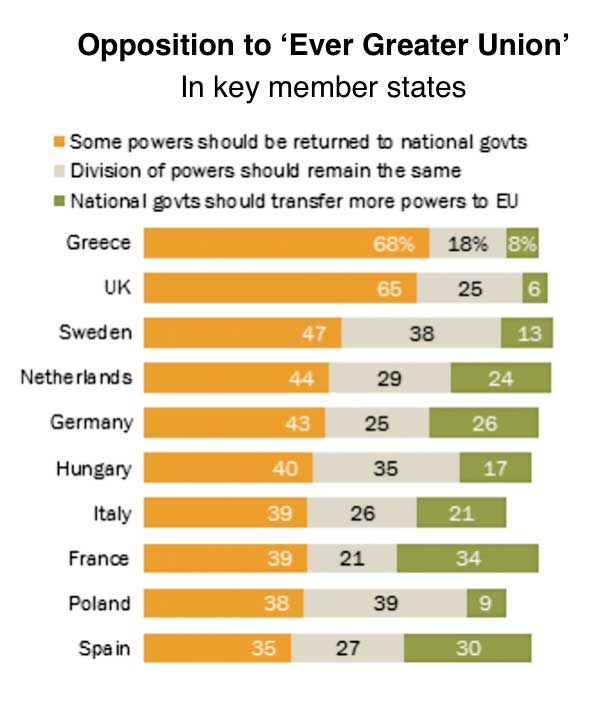Britain is not especially hostile to the EU. What separates it from the other large member states is not the level of popular hostility to the EU but the fact that the political elite in the UK has actually asked the electorate to express an opinion on the issue.
The level of disapproval of the EU in the UK is around the same level of disapproval as in Spain, Germany, the Netherlands and Sweden. The hostility of the French people towards the EU dwarfs that of the UK. If Pew’s latest Pan-European poll is any indication, the French government’s pro EU sentiments are hardly representative of the French population at large. In fact, a staggering 61% of French respondents indicated they would prefer to leave the EU — more than any of the other member states surveyed and 13 percentage points more than the UK. A clear majority is opposed to “ever closer union” and wants powers returned to the French parliament, a finding that clashes starkly with President Francois Hollande’s dogged insistence that “more Europe” is the answer to the EU’s woes.
The Pew survey includes countries that account for 80% of the EU-28 population and 82% of the EU’s GDP. Based on the Pew poll data a median of just 51% across 10 EU countries surveyed have a favourable view of the European Union. A median of 42% in these 10 nations want more power returned to their national capitals, while only 19% favour giving Brussels more power and 27% favour the status quo. Nevertheless, a median of 70% in the nine EU nations surveyed that don’t get a vote June 23 believe it would be bad for the EU if the UK decided to depart. Only 16% say it would be a good thing.
The EU’s strongest backers are the Poles (72%) and the Hungarians (61%). In many other nations, support is tepid. Just 27% of the Greeks, 38% of the French and 47% of the Spanish have a favourable opinion of the EU. Notably, 44% of the British view the EU favourably, including 53% of the Scottish.
EU favourability is down in five of the six nations surveyed in both 2015 and 2016. There has been a double-digit drop in France (down 17 percentage points) and Spain (16 points), and single-digit declines in Germany (8 points), the United Kingdom (7 points) and Italy (6 points).
The key issues driving dissatisfaction with the EU are the economy, the handling of the refugee crisis and the commitment to ‘ever greater union’.
A lot of the disaffection with the EU among Europeans can be attributed to Brussels’ handling of the refugee issue. In every country surveyed, overwhelming majorities disapprove of how Brussels has dealt with the problem. This includes 94% of Greeks, 88% of Swedes and 77% of Italians. The strongest approval of EU management of the refugee crisis is in the Netherlands, but that backing is at a low 31%.
The EU’s handling of economic issues is another huge source of disaffection with the institution. About nine-in-ten Greeks (92%) disapprove of how the EU has dealt with the ongoing economic crisis. Roughly two-thirds of the Italians (68%), French (66%) and Spanish (65%) similarly disapprove. (France and Spain are the two nations where the favourability of the EU has recently experienced the largest decline.) Majorities in Sweden (59%) and the UK (55%), including 84% of UKIP supporters, also disapprove of the EU’s job in dealing with economic challenges. The strongest approval of Brussels’ economic efforts is in Poland and Germany (both 47%).
The survey results show that right across Europe there is a clear majority opposed to further integration and deeper union. The Pew Research Center survey finds that in six of 10 countries more people want devolution of EU power than support the status quo or favour giving more power to the Brussels-based institution.
Roughly two-thirds of Greeks (68%) and British (65%) want some EU power returned to Athens and London. This is particularly the view of British ages 50 and older (73%); only 51% of those ages 18-34 agree. Signficant numbers in Sweden (47%), the Netherlands (44%), Germany (43%) and Italy (39%) also want to curtail EU power.
Conversely, there is little enthusiasm for transferring more power to Brussels. As the British head to the polls, just 6% of the public in the UK wants such an outcome. And only 8% of Greeks favour more power for the EU. The strongest backing for an ever closer Europe is only 34%, in France. In most countries a quarter or more of the public prefers to keep the current division of power.
The opposition to ever greater union poses a deep and intractable problem for the EU because monetary union has already taken the Union half way along the road to greater union and it is now stuck in a sort of limbo. None of the politicians and functionaries that proposed monetary union at the time of the Maastricht treaty negotiations had any illusions about monetary union being viable on its own without political union. All understood that lurching forward with monetary union would create, further down the road, instability and problems that could only be addressed by further political union. The backers of monetary union mistakenly believed that the contradictions and problems that would arise from monetary union would act to drive forward political union. In fact the opposite has happened. So now the EU is trapped in a developmental limbo, stuck with a monetary union that acts to exacerbate economic divergence and polarisation, that subverts solidarity, and deepens centrifugal political tensions, but which short of a catastrophic moment of failure (which I believe may well come) cannot be undone.
The decision to push forward with monetary union without political union and without a popular mandate for political union may prove to have been the single most catastrophic political mistake in post war European history.
France is the next weak link
The country that is now most hostile to the EU is France. President Hollande is a victim of his own campaign rhetoric four years ago, when he sold 1970s nostalgia and pledged plans to raise public spending: “Finance is my enemy,” he said. But he has failed to deliver a coherent reform program and is struggling to deliver the austerity program required by the Stablity and Growth Pact as the French economy stagnates and very high unemployment has become entrenched and endemic. His credibility is now so low – with 84% expressing a “total lack of confidence” in the latest TNS-Sofres poll – that France is effectively stuck in limbo.
As France continues to tentatively tighten the austerity screw, at Brussels’ behest, opposition to both the government — already the most unpopular ever — and the EU is almost certain to rise. French protests against the government’s labor reforms continued to rage, once again, Air France pilots are on strike, forcing the company to cancel at least 30% of its flights; so, too, are workers at three of Total’s five refineries and garbage collectors in Paris and Marseilles, leaving the stench of rotten, uncleared garbage to waft through parts of the cities.
European Commission President Jean Claude Juncker recently tried to convince a hall packed with French mayors of the need for austerity à la carte in France. The linchpin of his argument was that France has been allowed by the Commission to repeatedly break Eurozone fiscal rules, not just due to its size and influence over EU policy but also its “reflexes, its internal reactions, its multiple facets” — an oblique reference to the tendency of its workers to bring the national economy to a halt whenever the government introduces measures that are not to their liking, as is happening right now.
The irony is that Juncker — who is famous for saying that when things get tough, “you have to lie” — is right on this point. Since 1999 France has broken the Eurozone’s 3% deficit limit during non-recessionary years 11 out of 16 times. That’s one more time than Greece and Portugal, three more times than Italy, and seven more times than Spain (which has broken the limit eight times but four of which were during years of recession, with the Commission’s blessing).
“If the Commission President says that things apply differently for France, then this really damages the credibility of the Commission as guardian of the pact,” retorted Eurogroup President Jeroen Dijsselbloem in an interview with German daily Süddeutsche Zeitung and six other European newspapers.
According to George Soros, the hedge fund billionaire who broke the Bank of England 24 years ago and is once again out of retirement, a British exit could “unleash a general exodus, and the disintegration of the European Union will become practically unavoidable.”
Inevitably it is the French that lead the hardliners on post Brexit negotiations
The lack of popular support for the pro-EU position of the French government (and all mainstream parties) is the reason that the French are leading the call for a more punitive response should the Brits vote for Brexit. The measures under discussion in Paris include proposals to rapidly expedite Britain’s removal from all EU treaties rather than let negotiations drag on, as well as restrict the “passporting” of financial services, which allows foreign-owned companies to do business with the EU via offices located in Britain.
“I would be very tough [on this point],” said Sylvie Goulard, a French MEP who sits on the committee for economic and monetary affairs. “I see no reason to give passporting to a country that decides in a sovereign way to leave the EU… The day the U.K. leaves … you cannot consider the British supervising authority as an authority of the EU.” Such a response could have a devastating impact on the UK’s core industry, financial services.
The City of London is the place with most at stake in the Brexit debate. Its two biggest rivals, Paris and Frankfurt, are vying to take a piece of the action. If Britain left the EU, member countries might re-evaluate whether to recognise clearing houses such as LCH.Clearnet, and may push to force all clearing houses to be based inside the EU — as the European Central Bank has already suggested should be the case.
A Britain-less EU might even try to draw business away from the City of London. “I can tell you there is already intense thinking about creating a financial hub on the Continent,” said Elisabeth Guigou, Socialist head of the foreign affairs committee in France’s lower house National Assembly. The fact that Frankfurt is home to the European Central Bank’s lavish headquarters makes it the most likely contender but that won’t stop Paris from laying claim to its share of the spoils.
Should we get Brexit after the 23rd of June the EU will be torn in two different directions. On the one hand its culture of compromise and negotiation, combined with the sheer weight of the UK’s economy (the world’s fifth largest and the second largest in the EU) means that facilitating a smooth transition to some sort of accommodating post Brexit trade arrangement will be be the best option in relation to business. It is likely that it will be Germany that leads a post Brexit pragmatic business focussed camp. On the other hand the fear of political contagion means that there will be a strong political argument to make the Brits exit as difficult as possible, to scare other member states who might tilt towards exit. This hardline camp will probably be led by the French government who not only have always wanted to marginalise the City of London but which is now sitting on top of an deeply euro-sceptic electorate, a mis-match that could lead to a political earthquake in France.





